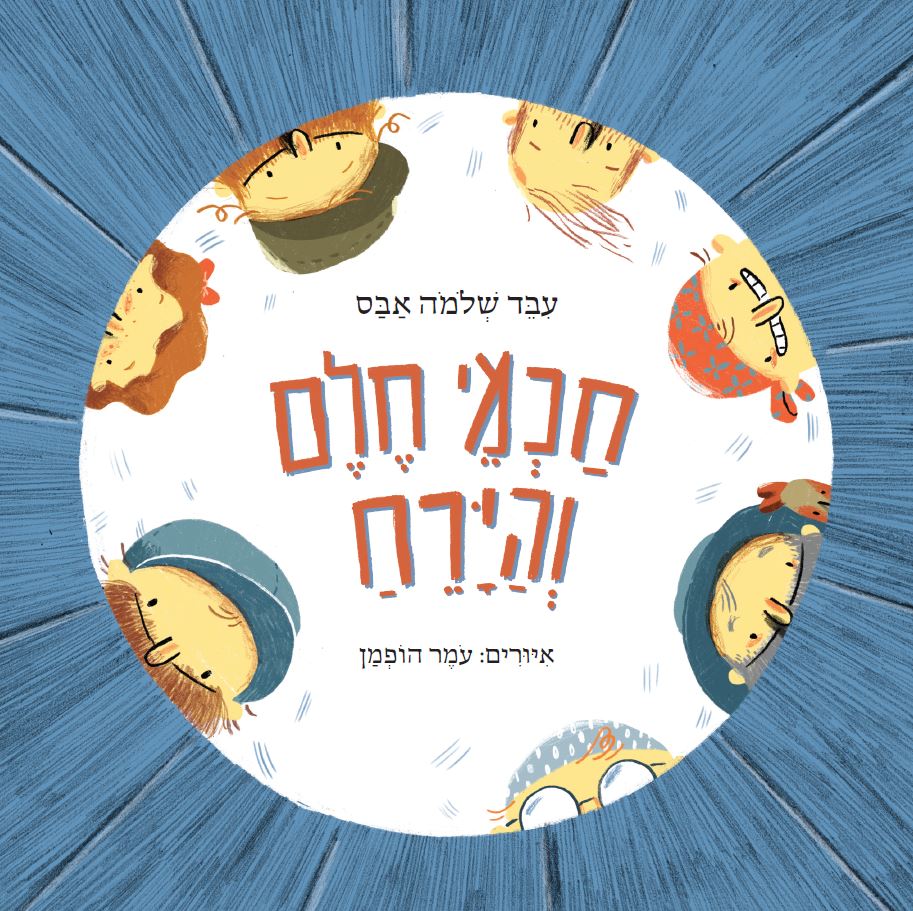The Wise Men of Chełm and the Moon
Adapted by Shlomo Abbas
Illustrated by Omer Hoffmann
Dear Parents,
Each month the moon "disappears" from the night sky, and the residents of Chełm are forced to stumble in the dark streets. Can they find a moon to light their way throughout the month? This new and amusing adaptation to a well-known Wise Men of Chełm tale is a gem of Jewish humor about the nature of the moon.
Chełm and Jewish Humor
A popular humorous Jewish tradition involves 200-year-old tales of the people of Chełm, a town in Poland. The stories were told throughout the generations in many versions, and collected in various anthologies by authors such as I.L. Peretz and Isaac Bashevis Singer. In them, the people of Chełm are reputed to come up with silly solutions to town problems. Bashevis Singer concluded his compilation of Chełm stories with the saying "All roads lead to Chełm; all the world is one big Chełm". Perhaps these tales are so well loved and amusing because we all at times behave in ways that counter all logic.
One who sees the renewal of the moon says: "Blessed be He the Renewer of Months" (Talmud Yerushalmi, Berachot, 65a)
The moon, in Hebrew יָרֵחַ, לְבָנָה or סַהַר (crescent), renews itself and changes each day. The cycle of the moon has an important role in Jewish tradition, as the Jewish calendar is lunar. The beginning of each Jewish month, Rosh Chodesh, is denoted by the new moon, and that is why in Hebrew a synonym for month is moon. The Jewish holidays are also therefore derived from the lunar cycle. In Jewish tradition, many a midrash, liturgical poem and blessing are dedicated to the renewal of the moon.
Family Activities
- You may enjoy looking at the illustrations and identifying other funny things about Chełm. Did you notice the square- wheeled bicycle? Try to guess why the lady sitting on the bench is hiding under an umbrella.
- Did you find this story funny? Do you know other stories about the people of Chełm, or tales about Hershele and Juha? You may want to read them together, or simply tell each other jokes.
- Perhaps you'd like to look out the window and search for the moon. What does it look like? You could draw the moon you saw, and hang the drawing by the window. Then return to the window and look at the moon again several nights later – does the moon look any different?
- You may enjoy taking a nocturnal walk together. Does your street look any different at night? What do you see? What sounds do you hear? You could look up at the sky, search for the moon, be reminded of the people of Chełm, and laugh...
- Who likes making crescent-shaped biscuits?
Ingredients:
100g of caster sugar
150g of butter
1 tsp of vanilla essence
1 tsp of lemon zest
2 cups of flour
1 flat tsp of baking powder
4 tbs of ground almonds
Castor sugar for sprinkling on baked biscuits
Instructions:
Mix the castor sugar and butter together in a mixer.
Add the vanilla essence and lemon zest.
Add the flour, baking powder and ground almonds, mixing it all together to form dough.
Take a piece of dough, roll it into a long, thin roll, and cut small crescent-shaped "tubes" out of it.
Place the little crescents on a cooking tray covered with parchment paper, and repeat until all the dough is used.
Bake in a preheated overn set to 175 degrees Celsius for 15 minutes, or until the edges of the crescents begin to turn golden.
Cool and sprinkle castor sugar.
"Be'teavon" - Bon Appétit!
Enjoy reading and discussing the story together!





